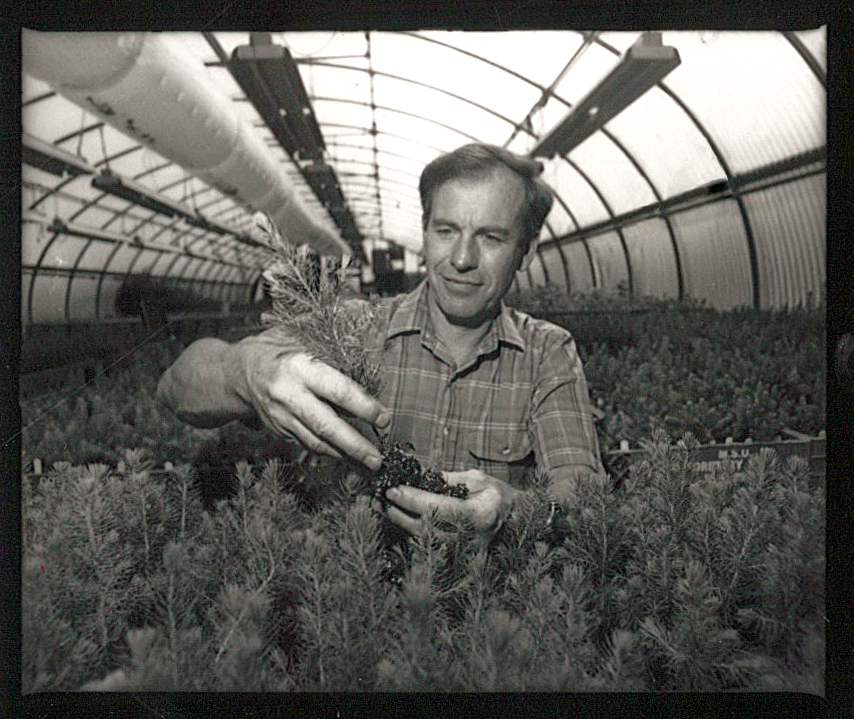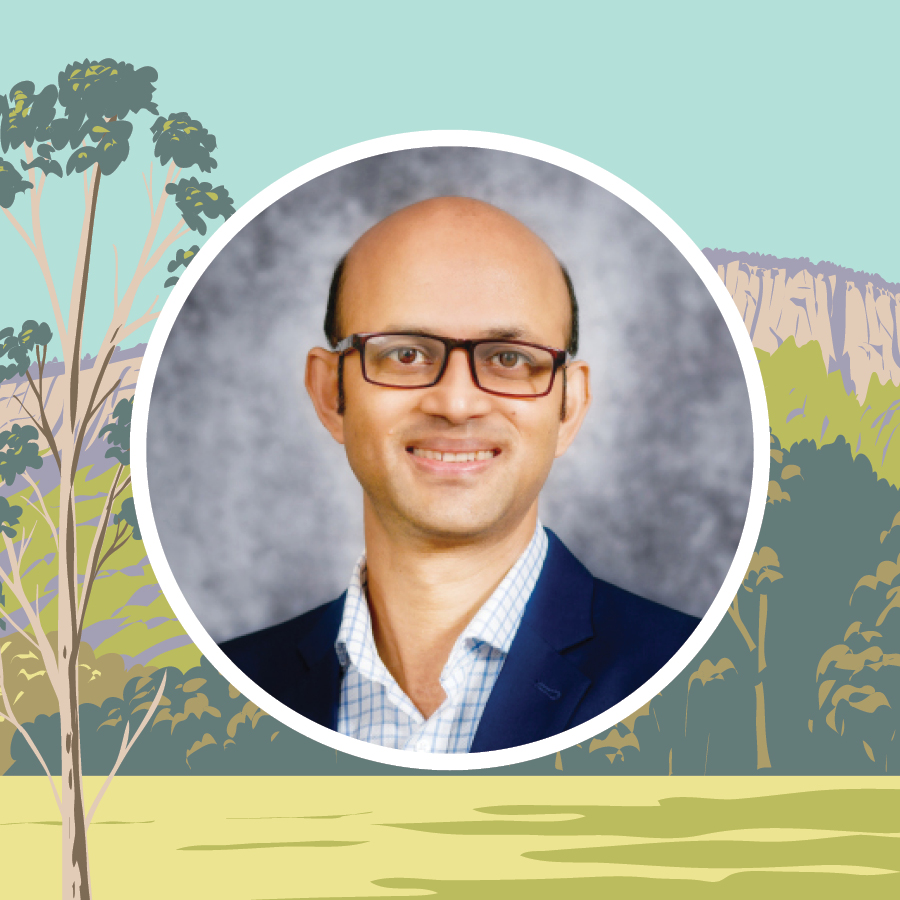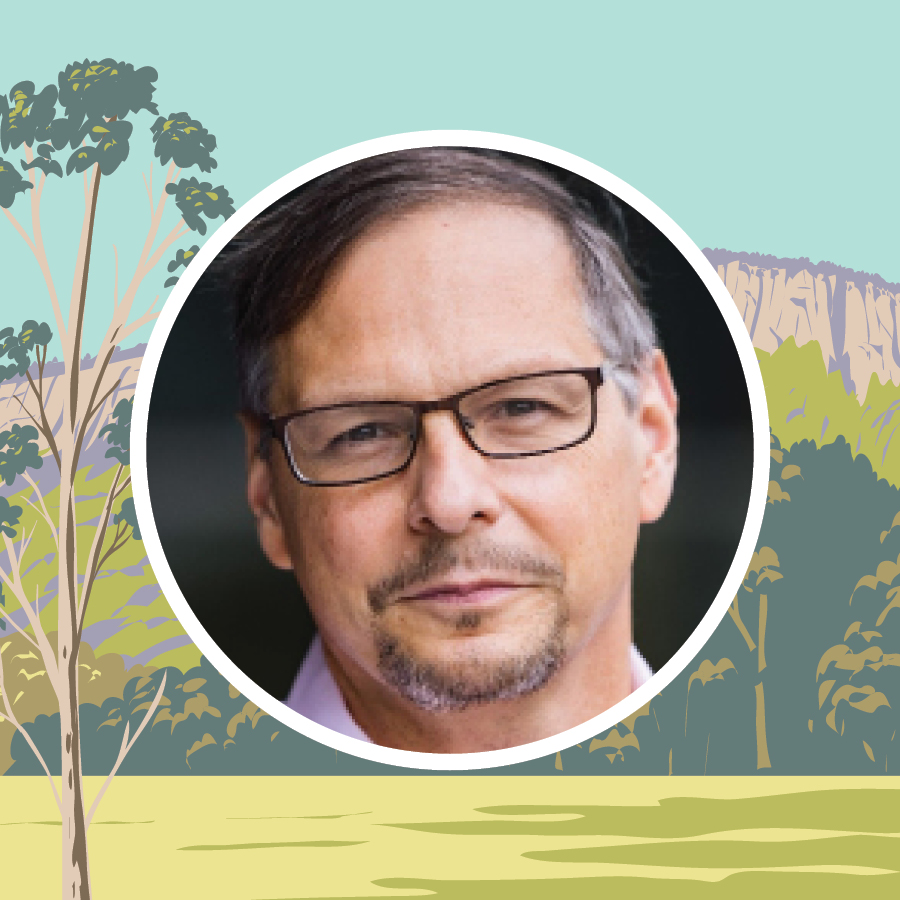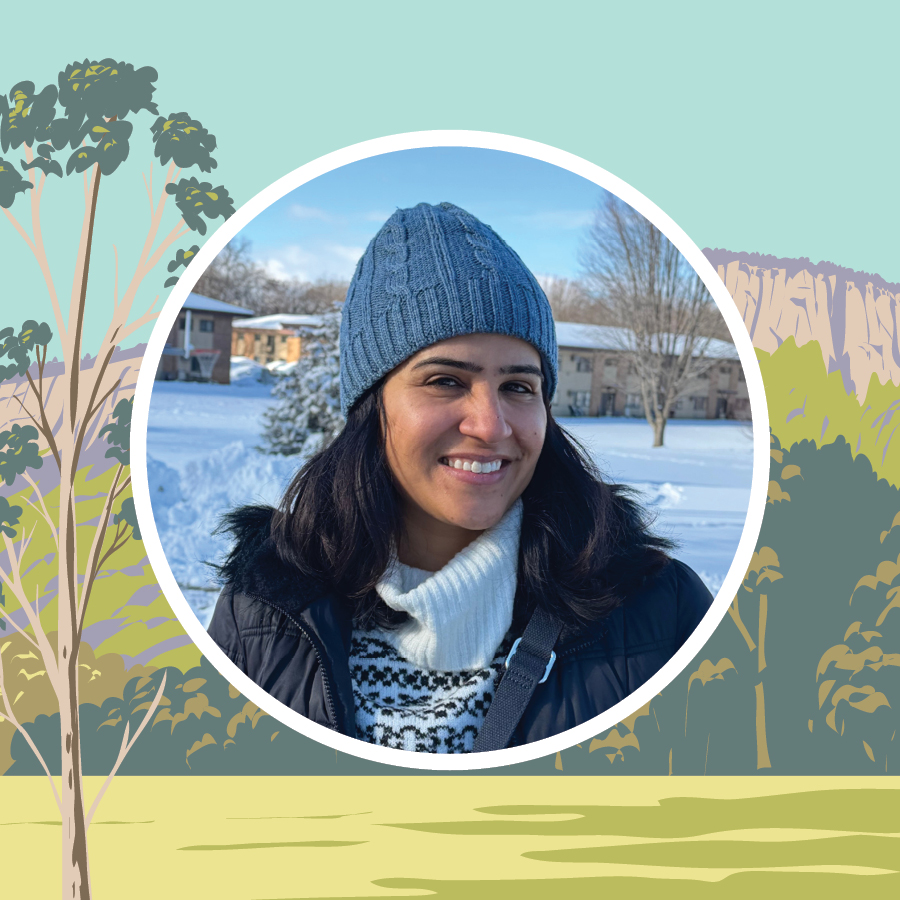Hanover Forest Science Seminar Series
Spring 2026

The Hanover Forest Science Seminar Series will be virtual and in-person for the Spring 2026 semester. Speakers will be available for questions immediately following their presentations.
Seminars are Mondays, from 11:30-12:30PM ET, in room 338 Natural Resources. All seminars will continue to be broadcast over Zoom.
View Past Hanover Presentations
Past Presentations:
2024-2025
- Andrew Eagar, “Missing the fungi for the trees – What 'mycorrhizal spillover' can tell us about current and future temperate hardwood forests and plant-microbe interactions under global change”
- Asia Dowtin, “Optimizing Our Approaches to Urban Forest Management”
- Jeremy Johnson, “Genetic Insights for Sustainable Forest Health”
- Richard Phillips, “Seeing the forest beneath the trees: Mycorrhizal fungi as trait integrators of ecosystem processes”
- Jenny Hellman, "Boots on The Ground: Lessons Learned from Reforestation Efforts Around the Globe"
- Patrick Mohney, "Crosscutting Issues and Programming in Michigan DNR – Office of Public Lands.”
- Bailey McNichol, “Climate variation structures tree seedling recruitment along resource gradients in a northern hardwood forest”
- Xuejum (Jun) Pan, “Advanced lignocellulosic materials for energy, environment, and packaging applications”
- Larry Nielsen, “Lessons from the great conservationists of the past”
- Dave Carter, “Advancing silviculture to meet the demands of today”
- Chemuku Wekesa, “Nexus between forest fragmentation and biodiversity conservation: the fate of threatened and endangered tree species in Kenya”
- Julie Rieland, “An interdisciplinary approach to plastic pollution: Social science research, biopolymers, and closing the loop”
2023-2024
- Amy Clark Eagle, "FSC Certification: Challenges and Opportunities in a Changing World"
- Pete Bettinger, "Ensuring sustainability and modifying traditional forest planning to acknowledge climate change: Challenges for the future"
- Lauren Cooper & Kylie Clay, “MSU Forest Carbon and Climate Program: Bridging research, engagement, and education for Michigan and beyond”
- Stephen Handler, "Climate change and Michigan forests: impacts, adaptation, and new resources"
- Neelam C. Poudyal, “Social feasibility of reforestation for carbon offset benefits on private open lands”
- Brent Sohngen, “20th Century Forests: How Carbon Fertilization and Management Built Today’s Massive Carbon Sink”
- Brittany Vanderwall, "The Family Forest Carbon Program: Unlocking Carbon Markets for Small Family Forest Landowners. An Overview of the Methodology and Application"
- Sara Ohrel, "Projections and Pathways: The Role of Forestry and Agriculture in Achieving U.S. GHG Mitigation Goals"
- Hillary Pine, "Michigan’s Forest History"
- Scott Stark, "The Importance of Amazon Forest-Climate Feedbacks for Earth’s Future"
- Raju Pokharel, "Woodshed Mapping: Identifying Locations, Assessing Feedstock Availability, Evaluating Economic and Environmental Impacts, and Attracting Investment in the Forest Products Industry"
- Daowei Zhang, "Forest Carbon Offset Protocols in Compliance Carbon Markets"
- Christine Carmichael, "Growing Towards Equitable Urban and Community Forestry Practices
- Lara T. Murray, "Entity-Scale Greenhouse Gas Quantification Guidance For Forest Management Activities Across the United States"
- Nana Tian, "Developing and Harnessing Climate-Smart Commodities From Hardwood Restoration For Small and Underserved Landowners in the Southern Bottomland Regions"
- Charles Frazier, "New Materials Through the Enigma That Is Lignin"
- Jagdish Poudel, "Unraveling the Impact of COVID-19 on Michigan’s Forest Products Industries"
- Raffaella Marzano, "Fire Ecology and Post-Disturbance Dynamics in Mountain Forests of the Alps. Passive vs Active Restoration Approaches After Stand-Replacing Events"
- Sandra Lupien, "MassTimber@MSU: Building Mass Timber Momentum Through Outreach, Research, Education, and Policy"
2021-2022
- Dominik Seidel, "Structure-function Relationships in Trees and Forests: New Insights from Fractal Analysis"
- Sam Cook, "Linking Future Forests Students to Greener Jobs"
- Prakash Nepal, "Impacts on Global Forests and Wood Product Markets of Increased Mass Timber Use in Buildings"
- Shivan GC, "Logging Sector in the Lake States of Michigan, Minnesota, and Wisconsin: Status, Issues and Economic Potential"
- Catherine Fahey, "The Role of Soil Fungi in the Response of Forests to Global Change”
- Luke McCormack, “Belowground strategies of trees and their links to whole-tree and ecosystem processes”
- Soledad Peresin, "Adding value to agri-forest biomass: An overview of nanocellulose and surface science research at Auburn University”
- David Macfarlane, "Linking forest conservation and climate change mitigation to sustainable livelihoods in the Yucatán of Mexico”
- Jeff Prestemon, "Housing starts and residential construction harvested wood products projections by SSP, 2020-2070”
- Peggi Clouston, “New England Species Mass Timber and other Emerging Bio-Based Building Technologies”
2020-2021
- Kyung-Hwan Han, “What Makes a Tree a Tree: Molecular Understanding of Tree Growth”
- Jesse Abrams, "Systems Thinking for Understanding U.S. National Forest Governance Dynamics"
- Scott Stark, "Forest-atmosphere interactions in a climate crisis: Amazon forest canopy’s resilience and global impacts"
- Valeriy Ivanov and Tyeen Taylor, "Cascade Hydromics in Amazonian Headwater Systems"
- Sarah Hines, "USDA Forest Service Urban Field Stations: Improving Lives in Cities and Beyond"
- Salli Dymond, "Water partitioning between trees, soils, and streams following forest disturbance"
- Anthony D'Amato, "Silviculture for Adaptation in North Temperate Forest Systems"
- Ritwhick Ghosh, "Governing Biodiversity Offsetting: What can Case Studies Teach Us?”
- Emily Huff, “The Different Management Perspectives of Forest Owners, Forest Users, and Forest Stewards”
- Asia Dowtin, “Water, Nutrient, and Knowledge Transport in Urban Forests”
- Mojgan Nejad, “Lignin-Based Bioproducts: Using the Underutilized Portion of Biomass in High-Value Products”
- Courtney Siegert, “A Tale of Tree Bark: How Morphology and Structure Influence Hydrology”
- Greg Latta, “Projecting US forest carbon accounts for policy evaluation: a market-based approach”
- Sam Cook, “Linking Future Forests Students to Greener Jobs”
- Katherine Wood, “Tree Seedling Functional Traits Mediate Survival Responses to Light Availability and Plant-Soil Feedback”
Upcoming:
-
Mar 23
-
Mar 30
-
Apr 13
Hanover Seminar Series: Francesco Petruzzellis
April 13, 2026 11:30AM – 12:30PM Natural Resources 338 & Zoom
About
The Hanover Forest Science Seminar Series was established in 2002 to honor the memory of Dr. Jim Hanover.
Hanover was trained in forest genetics. His research ranged extensively from basic science—outlining the mode of monoterpene inheritance in western white pine—to the applied research—developing faster growing red and jack pines in Michigan.
Hanover’s overriding passion was to develop genetically im proved planting stock and advance the science of forest genetics. He worked on conventional forest crops, biomass production, and the ornamental market. Hanover had many accomplishments throughout his career. He received the first patent granted to a woody plant under the Plant Variety Protection Act (for a blue and white spruce hybrid). He founded the Michigan Cooperative Tree Improvement Project, a collaboration with the Michigan DNR to provide genetically improved planting stock. He was also an MSU University Distinguished Professor.
proved planting stock and advance the science of forest genetics. He worked on conventional forest crops, biomass production, and the ornamental market. Hanover had many accomplishments throughout his career. He received the first patent granted to a woody plant under the Plant Variety Protection Act (for a blue and white spruce hybrid). He founded the Michigan Cooperative Tree Improvement Project, a collaboration with the Michigan DNR to provide genetically improved planting stock. He was also an MSU University Distinguished Professor.
Perhaps his greatest legacy is the many graduate students he mentored. His students have contributed to fields as varied as quantitative forest genetics, forest policy, forest economics, tree improvement, and even the development of peach rootstock and raspberry varieties.
Hanover was very active in the scientific community. He served as an officer on the editorial boards of several scientific journals. He also co-originated the biennial North American Forest Biology Workshop, chaired the Society of American Foresters Genetics and Tree Improvement Working Group, and served as Program Manager for the USDA Competitive Grants Program in Forest Biology.









 Print
Print Email
Email